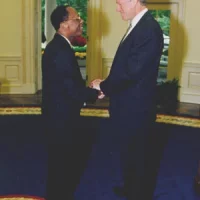The United States found itself embroiled in several interventions in the 1990s that focused on upholding basic human rights standards and encouraging democratic regimes to flourish, from Somalia to the Balkans to America’s own backyard in the Caribbean. Despite Haiti being the second nation in the Western Hemisphere to proclaim independence, it has suffered from… Read More "“The World Was Tired of Haiti”: The 1994 U.S. Intervention"
Sports Boycotts
Sport has often been used throughout history as a political tool. In particular, sport boycotts have been effective measures for countries to express disdain and condemnation for the actions of another. In the last half of the 20th Century, the more famous boycotts were imposed as a response to apartheid policies in South Africa during… Read More "Sports Boycotts"
The U.S. Returns Okinawa to Japan, 1971
In 1945, towards the end of World War II, the U.S. Army and Marine Corps invaded Okinawa with 185,000 troops; a third of the civilian population was killed. After the war, Okinawa became a de facto trustee of the U.S. government, which established several military bases there and on other Ryukyu islands. In addition, the U.S. Civil Administration of… Read More "The U.S. Returns Okinawa to Japan, 1971"
It’s Feng Shui or the Highway: Building the Chinese Embassy in Washington with I. M. Pei
Feng shui seeks to promote prosperity, good health, and general well-being by examining how energy, qi, (pronounced “chee”), flows through a particular room, house, building, or garden. Feng means “wind” and “shui” means water; in Chinese culture, wind and water are associated with good health so that good feng shui means good fortune, and bad… Read More "It’s Feng Shui or the Highway: Building the Chinese Embassy in Washington with I. M. Pei"
Martinis, Carpets and Sacks of Gold: A U.S. Diplomat in French Tunisia
Tunisia achieved independence from France after almost 75 years as a protectorate. Life under French rule was pleasant for some, including foreign diplomats. The number of French colonists grew, ultimately occupying one-fifth of the arable land of Tunisia, and the French directed the building of roads, ports and railroads, and the development of mines. But… Read More "Martinis, Carpets and Sacks of Gold: A U.S. Diplomat in French Tunisia"
From Russia with Love and Back Again: Rostropovich’s Exile and Return
Mstislav Rostropovich, considered one of the greatest cellists of the twentieth century, was born in the Soviet Socialist Republic of Azerbaijan in 1927. Graduating from the Moscow Conservatory, Rostropovich quickly established himself as the preeminent concert cellist in the USSR, collaborating with composers such as Shostakovich, Prokofiev, and Britten. In 1955 he married Galina Vishnevskaya, a… Read More "From Russia with Love and Back Again: Rostropovich’s Exile and Return"
134 Cells, One Inmate: The Closure of Spandau Prison
From November 1945 until October 1946, the International Military Tribunal indicted and prosecuted Nazi leaders for their roles in the Holocaust and other crimes against humanity at the Nuremberg Trials. Eleven of the 24 men who were tried as major war criminals were given the death penalty. Seven of them — Konstantin von Neurath, Erich… Read More "134 Cells, One Inmate: The Closure of Spandau Prison"
Hong Kong Returns to China, Part II
As the formal handover of Hong Kong to China approached, many grew concerned about Beijing’s intentions. Tens of thousands of Hong Kong citizens emigrated in the late 1980s and early 1990s for places like the UK and Vancouver while several came to the U.S. consulate in Hong Kong with claims of American citizenship. The event… Read More "Hong Kong Returns to China, Part II"
Hong Kong Returns to China, Part I
In September 1982, British Prime Minister Margaret Thatcher went to Beijing to begin a dialogue on the issue of Hong Kong, a small nation that had been a colony of Great Britain for over a century. At issue was the 99-year lease which gave Britain authority over the islands was set to expire in 1997,… Read More "Hong Kong Returns to China, Part I"
Evolution of the European Union: Early Seeds of Dissolution?
Britain has always been a part of Europe and yet at the same time, it has seen itself as distinct from the rest of the continent — the English Channel has often proven to be more than just a geographic barrier. However, in the shadow of World War II, as the continent realized the need for greater… Read More "Evolution of the European Union: Early Seeds of Dissolution?"

